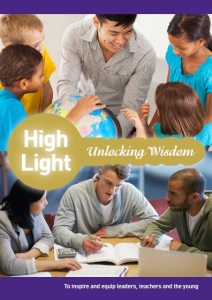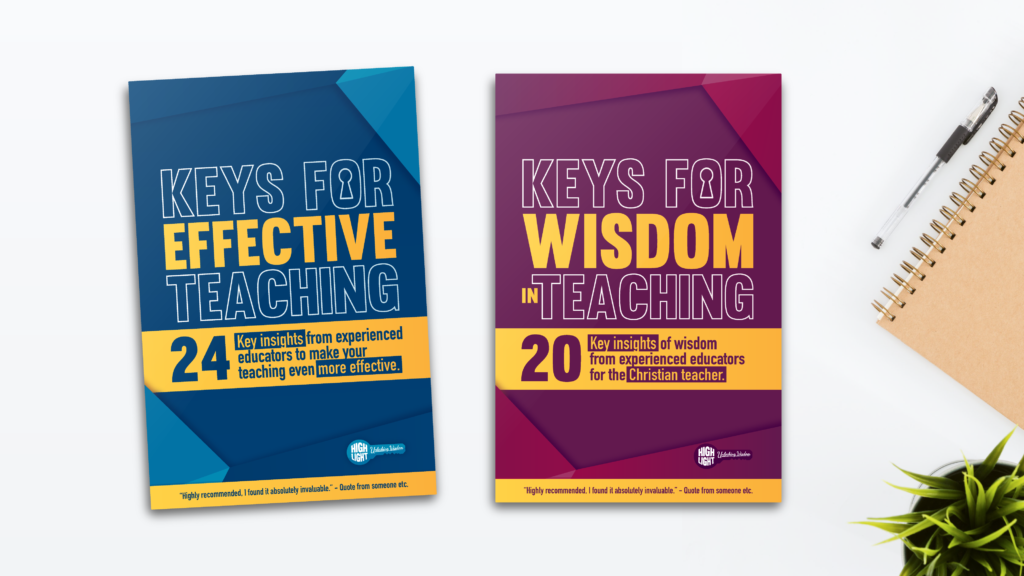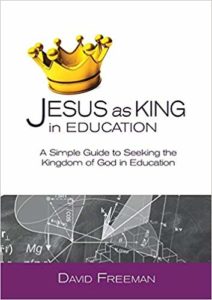
School communities have powerful potential to be catalysts for good. They are places where parents’ and teachers’ aspirations and hopes for our children’s future can be nurtured and kindled into lives which are fulfilled and purposeful. Character values are vital to this process.
HighLight has developed a varied selection of resources to equip educators to follow Jesus in the sphere of education, across diverse educational contexts. These will ‘unlock wisdom’ for you in your thinking, and practically, to support learners to flourish.
Accessing our resources
We’re in the process of trying to make our resources available for sale online. In the meantime please contact David at office@hightlightonline.org for more details.
Our Papers
Unlocking Wisdom in Character, Competence and Curriculum

This set of papers helps teachers and educational leaders to ‘Unlock Wisdom’ in the areas of character, competence, and curriculum.
HighLight believes that education in schools should involve academic and intellectual development toward the acquisition, not only of knowledge and understanding, but of wisdom: how to live. Wisdom is more than just experience; it is gained when the events of life are combined with a range of knowledge and understanding which brings insight beyond a person’s limitations. Wisdom is available when relevant values and truths are applied to shape decision-making for present and future life choices, including work and leisure.
Wisdom is not just a key – it is, we believe, the true aim of education.
Ten Top Tips
Ten top tips from a seasoned educational professional.
Our Books
We are currently turning our set of keys into two books which can be used both by the Christian and in secular educational contexts.

David Freeman is the author of a number of books including:

Diamonds Lost in the Sand: Gems of Wisdom for Educating Our Children
Diamonds in the Sand is a ‘must-read’ for all those interested and involved in any way with the raising and educating of children — leaders, teachers, parents and all home-educators. David Freeman writes from extensive personal experience over 45 years and provides insights into worldview and an historical perspective on the education process.

Jesus as King in Education: A Simple Guide to Seeking the Kingdom of God in Education
In this brief and succinct guide, David Freeman offers insights for the busy Christian teacher to assess just how effectively they are promoting the King and the Kingdom of God in their teaching and their classroom environment.
Our Keys
These ‘highlight’ truths in the areas of:
A Stimulating Learning Environment; Assessment; Behaviour Management; Educating the Whole Person; Honest Motives; Leadership, Vision and Ethos; Mentoring Teachers; Parents, Guardians and Carers; Social Justice And The Bigger Picture; Stewardship; Teaching and Learning; Technology in the classroom; Unconditional Acceptance; Uniqueness of the Individual; Worldview; Youth Worker as Role Model.
Accessing our resources
We’re in the process of trying to make our resources available for sale online. In the meantime please contact David at office@hightlightonline.org for more details.
The Key of Stewardship
Education needs to inculcate an attitude of responsible stewardship with regard to resources, finance and responsibilities on a personal level and with regard to responsibility as an employee and to citizenship in the wider community.
The Key of Teaching & Learning
Effective teaching, we believe, is based on a relationship of unconditional acceptance of pupils by the teacher. This relationship involves encouragement and affirmation. The values of forgiveness and grace are vital in any inclusion agenda.
The Key of Technology in the Classroom
The wise teacher aims to chart a course between naïve optimism and fear about technology and the possibilities and potential of technology in the classroom. This key explores this approach recognising the value of technology for learning but also the challenges it brings. Guidance is provided for the teacher and head about how to innovate in the use of technology whilst still valuing the ‘tried and tested’. A set of resources is provided for further reading.
The Key of Youth Worker as Role Model
The importance of this key is well documented. Students are always positively or adversely affected by the model their leader presents. Students should expect the example of the teacher/youth worker to be one of maturity, integrity and dedication to their welfare.
The Key of A Stimulating Learning Environment
The physical environment that surrounds learning should be bright, attractive and of high quality. Attractive displays with commendable examples of students’ work will inspire and motivate others to better efforts. The careful and thoughtful choice of aesthetically pleasing resources, artefacts and books should promote a healthy desire for learning. Professional guidance can ensure the best solutions when designing or facilitating the ideal learning environment, both inside and out, providing suitable facilities.
The Key of Assessment
In any assessment the person is more important than the performance. Assessment is a vital component of all teaching and learning. It should be used creatively in identifying current achievement and the planning of future objections. Testing and results should be used sensitively. Assessment is a reality check but it needs to encourage and promote a positive attitude.
The Key of Behaviour Management
It is not enough merely to ‘manage behaviour’; hence we suggest that the term ‘behaviour management’ is deficient. There is a need for agreement and training in what is acceptable as right and wrong, and what is appropriate, with regard to personal behaviour and relationships. True mentoring involves correction and sometimes consequences through loss of privilege. All such ‘discipline’ must be just and equitable with the aim of the restoration of the student once misdemeanours are dealt with. There needs to be a distinction between forgiveness and consequence. Unconditional acceptance of the student is the basis for all correction.
The Key of Educating The Whole Person
Education is much more than academic and practical knowledge; it involves the heart and spirit of the learner. The school’s curriculum must address physical, social, emotional, moral, cultural and spiritual development in addition to intellectual and academic development. Providing knowledge and attainment without also developing character and an ability to form and nurture relationship is counterproductive. In our ‘knowledge- economy’ intellectual skills and abilities enable people to become influential and powerful. It is important that responsibility is promoted alongside this authority to ensure the widest possible benefit.
Character development, therefore, must be part of a school’s responsibility. Education, in its broadest sense, involves life-long learning. In terms of youth it embraces the experience of youth work and many out-of-school activities in the wider community which, in conjunction with schools, prepare pupils for participation in adult life.
The Key of Honest Motives
The motives of education in schools must be altruistic and not utilitarian. Education must not be geared only to academic results, although these are inevitably an inherent and important aspect. The motives of true education must always be founded on a concern for the student as a unique individual. True education must have at its heart a genuine concern that the student be nurtured (in partnership with parents or carers) towards maturity. It should guide them towards their personal future with a growing awareness of the abilities, talents and character qualities they possess, which are indicators of their potential. It should provide challenges to them regarding areas where they need to change or develop. Our motives must educate them to ask and answer: “What is truth?â€
The Key of Leadership, Vision And Ethos
On entering a school, the atmosphere that is experienced is created by the ethos. This ethos is brought about by an agreement around a set of values and behaviours. A capable leader (whether headteacher, youth leader or any other leader) promotes these values by setting out and living out a clear vision and imparting it to the school community. Guiding principles determine structure, order, family atmosphere and positive values. These are all key ingredients. A vision and mission statement which identifies overall perspective, objective(s) and values to be promoted is essential. To achieve these requires a cohesive commitment from all leaders within the school. Both strategy and relational strengths are needed for effective progress to be measured.
The Key of Mentoring Teachers
The mentoring and coaching of the next and future generations towards an understanding of their identity and the best fulfilment of their lives should be promoted as a way of achieving the foundational keys. Mentoring is a relational process by one who has greater maturity and experience and can aid the development of the mentored. The person mentored must freely choose to relate to, receive and learn from, the mentor for the purpose of maturity. This Key is focusing on the mentoring of staff.
The Key of Parents, Carers And Guardians
Recognition is needed that parents/guardians/carers legally have responsibility for the education of their children and are partners with schools in this process. Education outside of the home, whether in or out of school, should serve them and enable them in their role. The ideal aim is to provide greater consistency in the values of home and school.
The Key of Social Justice And The Bigger Picture
The so-called ‘golden rule’: ‘treat others the way you would like to be treated’, remains a universally desirable principle which promotes social justice. This leads to an examination of relational approaches such as service (and stewardship). There is a need for a serving attitude which is aware of others and their needs. This leads on, in greater maturity, to the individual’s role in serving their community, with integrity, in order to make a positive difference and promote social justice.
The Key of Unconditional Acceptance
Effective teaching, we believe, is based on a relationship of unconditional acceptance of pupils by the teacher. This relationship involves encouragement and affirmation. There is an international golden rule ‘Treat others the way you would like to be treated.’ This is important in any inclusion agenda.
The Key of Uniqueness Of The Individual
The school ethos should reflect a ‘family’ rather than an institutional approach. Such an atmosphere is set by the leader (whether headteacher, youth leader or any other leader). A key component of the atmosphere to be set is the acceptance of individuals as persons in their own right and the value of their uniqueness and contribution. In such an atmosphere students will flourish. The promotion by the leader of shared objective(s) or purpose and his/her motivation of different members to work as team will create a sense of ‘family’. A vision and mission statement, which identifies overall perspective, objective(s) and values to be promoted, is essential.
The Key of Worldview
‘A worldview is a set of presuppositions (assumptions which may be true, partially true or entirely false) which we hold (consciously or subconsciously, consistently or inconsistently) about the basic make-up of our world’ (The World Next Door, James Sire p17). Increasingly, one of these assumptions is that everyone has the same world-view. Educational philosophy has also tried to develop thinking that remains common to every world view. We need to help our pupils to a greater understanding of our differences and have greater respect for one another. Understanding worldview, enabling students to determine their own distinctive world view and promoting tolerance of all worldviews is a key to community cohesion.